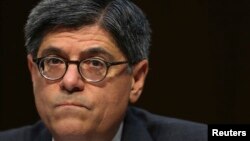JERUSALEM —
U.S. Treasury Secretary Jack Lew said Iran's economy remained in a state of distress due to sanctions over its nuclear program and that the United States would not rush into making a bad deal to prevent Iran from obtaining a nuclear weapon.
Lew said that the temporary and reversible sanctions relief has been limited.
“Iran is losing a significant amount in oil sales alone from the sanctions that remain in place, more than the value of the temporary relief,” Lew said in a speech in Jerusalem to the U.S.-Israel Joint Economic Development Group on Wednesday.
“As we approach the last month of the agreed upon period for negotiations, Iran's economy remains in a state of distress that brought the government to the negotiating table in the first place,” he said.
Such sustained pressure gives the United States the opportunity to pursue a negotiated agreement with Iran, in conjunction with its P5+1 partners, that will assure the international community that Iran's nuclear program is entirely peaceful, Lew said.
“We will take the time to do this right, and we will not rush into a bad deal,” he said. “No deal is better than a bad deal.”
Iran and six world powers re-launched talks on Tuesday to try to salvage a deal on its nuclear activity by a July deadline, striving to prevent a long-time standoff from descending into a wider Middle East war.
Israel has been concerned that the powers have not done enough to prevent Iran from developing nuclear weapons.
Israel also has voiced concern about the prospect of its closest ally, the United States, cooperating with what it considers its deadliest foe, Iran, to stave off a sectarian break-up of Iraq.
Lew said the United States was concerned about the “grave situation” in Iraq.
“As the president makes a decision on next steps, let me be clear that this is not primarily a military challenge,” he said, noting the United States has steadily increased security assistance to the Iraqi government over the past year,” he said.
“While it is evident that Iraq needs significantly more help to break the momentum of extremist groups and bolster the capabilities of Iraqi security forces, there is no military solution that will solve Iraq's problems,” he continued.
Any action the United States takes would have to be done in conjunction with a serious and sincere effort by Iraqi leaders to govern in a non-sectarian manner, promote stability and unity among a diverse population, build and invest in the capacity of security forces, and address the legitimate grievances of Sunni, Kurd, and Shia communities, Lew said.
Lew also expressed optimism about the U.S. economic recovery, which is in its fifth year.
“After a harsh winter that restrained growth in the first quarter, we are still expecting the underlying strength of the economy that was evident last year to result in a strong second half of this year, and economic data over the past three months supports that optimism,” he said.
Lew said that the temporary and reversible sanctions relief has been limited.
“Iran is losing a significant amount in oil sales alone from the sanctions that remain in place, more than the value of the temporary relief,” Lew said in a speech in Jerusalem to the U.S.-Israel Joint Economic Development Group on Wednesday.
“As we approach the last month of the agreed upon period for negotiations, Iran's economy remains in a state of distress that brought the government to the negotiating table in the first place,” he said.
Such sustained pressure gives the United States the opportunity to pursue a negotiated agreement with Iran, in conjunction with its P5+1 partners, that will assure the international community that Iran's nuclear program is entirely peaceful, Lew said.
“We will take the time to do this right, and we will not rush into a bad deal,” he said. “No deal is better than a bad deal.”
Iran and six world powers re-launched talks on Tuesday to try to salvage a deal on its nuclear activity by a July deadline, striving to prevent a long-time standoff from descending into a wider Middle East war.
Israel has been concerned that the powers have not done enough to prevent Iran from developing nuclear weapons.
Israel also has voiced concern about the prospect of its closest ally, the United States, cooperating with what it considers its deadliest foe, Iran, to stave off a sectarian break-up of Iraq.
Lew said the United States was concerned about the “grave situation” in Iraq.
“As the president makes a decision on next steps, let me be clear that this is not primarily a military challenge,” he said, noting the United States has steadily increased security assistance to the Iraqi government over the past year,” he said.
“While it is evident that Iraq needs significantly more help to break the momentum of extremist groups and bolster the capabilities of Iraqi security forces, there is no military solution that will solve Iraq's problems,” he continued.
Any action the United States takes would have to be done in conjunction with a serious and sincere effort by Iraqi leaders to govern in a non-sectarian manner, promote stability and unity among a diverse population, build and invest in the capacity of security forces, and address the legitimate grievances of Sunni, Kurd, and Shia communities, Lew said.
Lew also expressed optimism about the U.S. economic recovery, which is in its fifth year.
“After a harsh winter that restrained growth in the first quarter, we are still expecting the underlying strength of the economy that was evident last year to result in a strong second half of this year, and economic data over the past three months supports that optimism,” he said.





